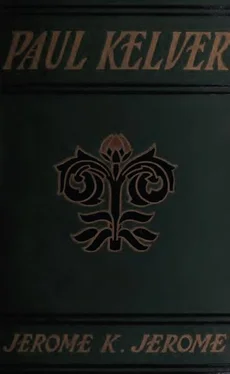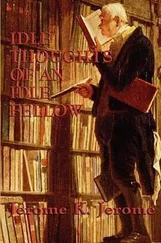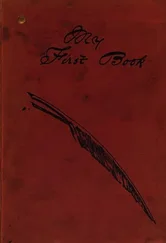Jerome Jerome - Paul Kelver
Здесь есть возможность читать онлайн «Jerome Jerome - Paul Kelver» весь текст электронной книги совершенно бесплатно (целиком полную версию без сокращений). В некоторых случаях можно слушать аудио, скачать через торрент в формате fb2 и присутствует краткое содержание. Город: New York, Год выпуска: 1902, Издательство: Dodd, Mead & Company, Жанр: Классическая проза, на английском языке. Описание произведения, (предисловие) а так же отзывы посетителей доступны на портале библиотеки ЛибКат.
- Название:Paul Kelver
- Автор:
- Издательство:Dodd, Mead & Company
- Жанр:
- Год:1902
- Город:New York
- ISBN:нет данных
- Рейтинг книги:3 / 5. Голосов: 1
-
Избранное:Добавить в избранное
- Отзывы:
-
Ваша оценка:
- 60
- 1
- 2
- 3
- 4
- 5
Paul Kelver: краткое содержание, описание и аннотация
Предлагаем к чтению аннотацию, описание, краткое содержание или предисловие (зависит от того, что написал сам автор книги «Paul Kelver»). Если вы не нашли необходимую информацию о книге — напишите в комментариях, мы постараемся отыскать её.
Paul Kelver — читать онлайн бесплатно полную книгу (весь текст) целиком
Ниже представлен текст книги, разбитый по страницам. Система сохранения места последней прочитанной страницы, позволяет с удобством читать онлайн бесплатно книгу «Paul Kelver», без необходимости каждый раз заново искать на чём Вы остановились. Поставьте закладку, и сможете в любой момент перейти на страницу, на которой закончили чтение.
Интервал:
Закладка:
The gallant gentleman! How long and how bravely he fought! But in the end it was the Dragon triumphed, the Knight that lay upon the ground, his great heart still. I have read how, with the sword of Honest Industry, one may always conquer this grim Dragon. But such was in foolish books. In truth, only with the sword of Chicanery and the stout buckler of Unscrupulousness shall you be certain of victory over him. If you care not to use these, pray to your Gods, and take what comes with a stout heart.
Chapter III.
How Good Luck Knocked at the Door of the Man in Grey.
“Louisa!” roared my father down the kitchen stairs, “are you all asleep? Here have I had to answer the front door myself.” Then my father strode into his office, and the door slammed. My father could be very angry when nobody was by.
Quarter of an hour later his bell rang with a quick, authoritative jangle. My mother, who was peeling potatoes with difficulty in wash-leather gloves, looked at my aunt who was shelling peas. The bell rang again louder still this time.
“Once for Louisa, twice for James, isn't it?” enquired my aunt.
“You go, Paul,” said my mother; “say that Louisa—” but with the words a sudden flush overspread my mother's face, and before I could lay down my slate she had drawn off her gloves and had passed me. “No, don't stop your lessons, I'll go myself,” she said, and ran out.
A few minutes later the kitchen door opened softly, and my mother's hand, appearing through the jar, beckoned to me mysteriously.
“Walk on your toes,” whispered my mother, setting the example as she led the way up the stairs; which after the manner of stairs showed their disapproval of deception by creaking louder and more often than under any other circumstances; and in this manner we reached my parents' bedroom, where, in the old-fashioned wardrobe, relic of better days, reposed my best suit of clothes, or, to be strictly grammatical, my better.
Never before had I worn these on a week-day morning, but all conversation not germane to the question of getting into them quickly my mother swept aside; and when I was complete, down even to the new shoes—Bluchers, we called them in those days—took me by the hand, and together we crept down as we had crept up, silent, stealthy and alert. My mother led me to the street door and opened it.
“Shan't I want my cap?” I whispered. But my mother only shook her head and closed the door with a bang; and then the explanation of the pantomime came to me, for with such “business”—comic, shall I call it, or tragic?—I was becoming familiar; and, my mother's hand upon my shoulder, we entered my father's office.
Whether from the fact that so often of an evening—our drawing-room being reserved always as a show-room in case of chance visitors; Cowper's poems, open face-downwards on the wobbly loo table; the half-finished crochet work, suggestive of elegant leisure, thrown carelessly over the arm of the smaller easy-chair—this office would become our sitting-room, its books and papers, as things of no account, being huddled out of sight; or whether from the readiness with which my father would come out of it at all times to play at something else—at cricket in the back garden on dry days or ninepins in the passage on wet, charging back into it again whenever a knock sounded at the front door, I cannot say. But I know that as a child it never occurred to me to regard my father's profession as a serious affair. To me he was merely playing there, surrounded by big books and bundles of documents, labelled profusely but consisting only of blank papers; by japanned tin boxes, lettered imposingly, but for the most part empty. “Sutton Hampden, Esq.,” I remember was practically my mother's work-box. The “Drayton Estates” yielded apparently nothing but apples, a fruit of which my father was fond; while “Mortgages” it was not until later in life I discovered had no connection with poems in manuscript, some in course of correction, others completed.
Now, as the door opened, he rose and came towards us. His hair stood up from his head, for it was a habit of his to rumple it as he talked; and this added to his evident efforts to compose his face into an expression of businesslike gravity, added emphasis, if such were needed, to the suggestion of the over long schoolboy making believe.
“This is the youngster,” said my father, taking me from my mother, and passing me on. “Tall for his age, isn't he?”
With a twist of his thick lips, he rolled the evil-smelling cigar he was smoking from the left corner of his mouth to the right; and held out a fat and not too clean hand, which, as it closed round mine, brought to my mind the picture of the walrus in my natural history book; with the other he flapped me kindly on the head.
“Like 'is mother, wonderfully like 'is mother, ain't 'e?” he observed, still holding my hand. “And that,” he added with a wink of one of his small eyes towards my father, “is about the 'ighest compliment I can pay 'im, eh?”
His eyes were remarkably small, but marvellously bright and piercing; so much so that when he turned them again upon me I tried to think quickly of something nice about him, feeling sure that he could see right into me.
“And where are you thinkin' of sendin' 'im?” he continued; “Eton or 'Arrow?”
“We haven't quite made up our minds as yet,” replied my father; “at present we are educating him at home.”
“You take my tip,” said the fat man, “and learn all you can. Look at me! If I'd 'ad the opportunity of being a schollard I wouldn't be here offering your father an extravagant price for doin' my work; I'd be able to do it myself.”
“You seem to have got on very well without it,” laughed my father; and in truth his air of prosperity might have justified greater self-complacency. Rings sparkled on his blunt fingers, and upon the swelling billows of his waistcoat rose and sank a massive gold cable.
“I'd 'ave done better with it,” he grunted.
“But you look very clever,” I said; and though divining with a child's cuteness that it was desired I should make a favourable impression upon him, I hoped this would please him, the words were yet spontaneous.
He laughed heartily, his whole body shaking like some huge jelly.
“Well, old Noel Hasluck's not exactly a fool,” he assented, “but I'd like myself better if I could talk about something else than business, and didn't drop my aitches. And so would my little gell.”
“You have a daughter?” asked my mother, with whom a child, as a bond of sympathy with the stranger took the place assigned by most women to disrespectful cooks and incompetent housemaids.
“I won't tell you about 'er. But I'll just bring 'er to see you now and then, ma'am, if you don't mind,” answered Mr. Hasluck. “She don't often meet gentle-folks, an' it'll do 'er good.”
My mother glanced across at my father, but the man, intercepting her question, replied to it himself.
“You needn't be afraid, ma'am, that she's anything like me,” he assured her quite good-temperedly; “nobody ever believes she's my daughter, except me and the old woman. She's a little lady, she is. Freak o' nature, I call it.”
“We shall be delighted,” explained my mother.
“Well, you will when you see 'er,” replied Mr. Hasluck, quite contentedly.
He pushed half-a-crown into my hand, overriding my parents' susceptibilities with the easy good-temper of a man accustomed to have his way in all things.
“No squanderin' it on the 'eathen,” was his parting injunction as I left the room; “you spend that on a Christian tradesman.”
It was the first money I ever remember having to spend, that half-crown of old Hasluck's; suggestions of the delights to be derived from a new pair of gloves for Sunday, from a Latin grammar, which would then be all my own, and so on, having hitherto displaced all less exalted visions concerning the disposal of chance coins coming into my small hands. But on this occasion I was left free to decide for myself.
Читать дальшеИнтервал:
Закладка:
Похожие книги на «Paul Kelver»
Представляем Вашему вниманию похожие книги на «Paul Kelver» списком для выбора. Мы отобрали схожую по названию и смыслу литературу в надежде предоставить читателям больше вариантов отыскать новые, интересные, ещё непрочитанные произведения.
Обсуждение, отзывы о книге «Paul Kelver» и просто собственные мнения читателей. Оставьте ваши комментарии, напишите, что Вы думаете о произведении, его смысле или главных героях. Укажите что конкретно понравилось, а что нет, и почему Вы так считаете.












